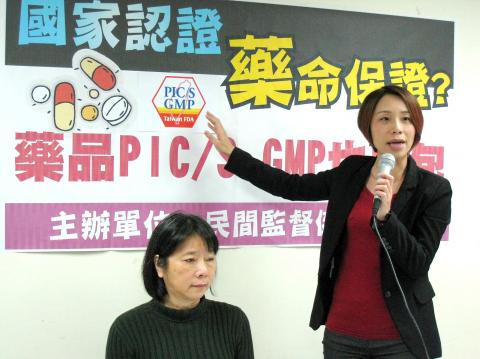The National Health Insurance Civilian Surveillance Alliance yesterday questioned the legitimacy of a certification for pharmaceutical manufacturers after a majority of the manufacturers that were required by the Food and Drug Administration (FDA) to re-file bioequivalence testing (BE) reports for changes made to their products were awarded PIC/S GMP or GMP certification.
BE testing is conducted to ensure that a generic drug delivers the same therapeutic effect as a reference brand-name pharmaceutical.
In response, the agency said that the changes to the drugs were “legitimate” and have no negative impact on drug safety.

Photo: Wei Yi-chia, Taipei Times
At the end of August, the health insurance watchdog held a press conference to report that as many as 3,841 drug products failed to comply with pharmaceutical regulations after making changes to package inserts, packaging and the excipients used in drugs without seeking re-approval by the regulator.
In response, the agency promised to hold risk assessment meetings to evaluate the drugs that had been altered.
This month, the agency announced that 33 out of 3,841 generic drug products would need to be tested for their bioequivalence with brand-name medicines, with 21 more to be examined.
The group found that 10 of the 11 drug manufacturers that produce the 33 drugs are PIC/S GMP (Pharmaceutical Inspection Convention and Pharmaceutical Inspection Co-operation Scheme, or the guide to Good Manufacturing Practice for medicinal products) or GMP certified.
“The government has required all pharmaceutical manufacturers to be PIC/S-certified by the end of next year, after which those without will not be permitted to make or sell drugs in Taiwan,” alliance spokeswoman Eva Teng (滕西華) said.
“However, the 10 manufacturers account for 15.8 percent of the 57 PIC/S GMP-certified manufacturers in the country. This makes us concerned that the certification does not guarantee drug quality,” Teng added.
The lack of BE testing reports for drugs that have been altered is a major problem, the group said.
“Changing the excipient, the diluent or the vehicle of a drug could decrease its therapeutic effect,” alliance convener Huang Sue-ying (黃淑英) said, adding that the agency should have ordered that the 33 drug products be pulled off shelves immediately after the announcement this month.
“The agency asked doctors to look for substitutes as soon as possible, and said that the drugs were without health risks,” she said.
FDA official Chi Jo-feng (祁若鳳) said that the PIC/S GMP certificate would not be revoked unless the violations are “grave,” such as producing counterfeit drugs, adding that the drugs were not withdrawn from the market immediately because some patients need time to switch to a new drug.
The agency updated the list in a statement yesterday, announcing the final result of the assessment for the need of BE testing on a total of 54 drugs (including the 33 announced earlier), which said that only nine of the 54 would need to redo BE testing.
One of the 33 drugs required to be tested this month was made exempt because the manufacturer had subsequently handed in relevant documents, while several others decided to revert to the original formula or simply give up the permit for the drug and had their products pulled off shelves, an FDA official said.

Alain Robert, known as the "French Spider-Man," praised Alex Honnold as exceptionally well-prepared after the US climber completed a free solo ascent of Taipei 101 yesterday. Robert said Honnold's ascent of the 508m-tall skyscraper in just more than one-and-a-half hours without using safety ropes or equipment was a remarkable achievement. "This is my life," he said in an interview conducted in French, adding that he liked the feeling of being "on the edge of danger." The 63-year-old Frenchman climbed Taipei 101 using ropes in December 2004, taking about four hours to reach the top. On a one-to-10 scale of difficulty, Robert said Taipei 101

Nipah virus infection is to be officially listed as a category 5 notifiable infectious disease in Taiwan in March, while clinical treatment guidelines are being formulated, the Centers for Disease Control (CDC) said yesterday. With Nipah infections being reported in other countries and considering its relatively high fatality rate, the centers on Jan. 16 announced that it would be listed as a notifiable infectious disease to bolster the nation’s systematic early warning system and increase public awareness, the CDC said. Bangladesh reported four fatal cases last year in separate districts, with three linked to raw date palm sap consumption, CDC Epidemic Intelligence

US climber Alex Honnold left Taiwan this morning a day after completing a free-solo ascent of Taipei 101, a feat that drew cheers from onlookers and gained widespread international attention. Honnold yesterday scaled the 101-story skyscraper without a rope or safety harness. The climb — the highest urban free-solo ascent ever attempted — took just more than 90 minutes and was streamed live on Netflix. It was covered by major international news outlets including CNN, the New York Times, the Guardian and the Wall Street Journal. As Honnold prepared to leave Taiwan today, he attracted a crowd when he and his wife, Sanni,

Taiwanese and US defense groups are collaborating to introduce deployable, semi-autonomous manufacturing systems for drones and components in a boost to the nation’s supply chain resilience. Taiwan’s G-Tech Optroelectronics Corp subsidiary GTOC and the US’ Aerkomm Inc on Friday announced an agreement with fellow US-based Firestorm Lab to adopt the latter’s xCell, a technology featuring 3D printers fitted in 6.1m container units. The systems enable aerial platforms and parts to be produced in high volumes from dispersed nodes capable of rapid redeployment, to minimize the risk of enemy strikes and to meet field requirements, they said. Firestorm chief technology officer Ian Muceus said